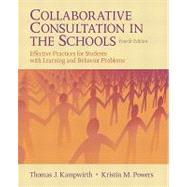
CHAPTER 1
Overview of School-Based Consultation
Objectives
Consultation and Collaboration: Definitions, Distinctions and Characteristics
Collaborative Consultation as an Expanded Role
Defining Characteristics and Goals of Collaboration Consultation
The Triadic Nature of Consultation
The Role of Process and Content Expertise in Consultation
Consultation at Different Levels of Problem Severity
Recent Changes in Education Affecting School Consultation
Response to Intervention
Why is Collaborative Consultation Replacing Expert Models of Consultation?
What is the Present Status of Collaborative Consultation in the Schools?
Research on the Effectiveness of School Consultation
Summary
References
CHAPTER 2
Consultation Models and Professional Practices
Objectives
A Rationale for a Model
Two Theoretical Traditions
Behavioral Paradigm
Mental Health Paradigm
Consultation Models
Models of School Consultation
Conjoint Behavioral Consultation
Instructional Consultation
Ecobehavioral Consultation
Consultation Configurations and Settings
Beginning Teacher Support Consultation
Student Study Teams (SST)
Resource/Consulting Teacher (R/Ct) Program Model
Individualized Education Program (IEP) Team
Transition Planning Teams (TPT)
Roles, Skills and Activities of School-Based Consultants
Student Study Teams (SST)
The Importance of Structure
Consulting with Parents and Families
Summary
References
CHAPTER 3
Problem-Solving Consultation in a Response-to-Intervention System
Objectives
Steps to Follow in the Consultation Process
Establish Rapport
Problem Identification
Problem Analysis
Intervention Development and Implementation
Evaluate the Effectiveness of the Interventions and Recycle if Necessary
Response to Intervention (RtI)
Tier 1: Universal Prevention
Tier 2: Selective Intervention
Initial Referral to SST
Initial Discussion with the Teacher(s)
Classroom (Ecological) Observation
Using Parents as Allies in the Consultation Process
The First SST Meeting
The Follow-up SST Meeting
Tier 3: Indicated Interventions
Assessment of the Student
Learning/Achievement Assessment
Functional Behavioral Assessment/Analysis
Biophysical Problems
Psychological Assessment
Specialists Assessments
Planning or Modifying Interventions
Treatment Integrity
Summary
References
CHAPTER 4
Communication and Interpersonal Skills
Objectives
Communication Skills
Attending
Active Listening
Being Empathetic
Being Assertive
Questioning
The Interview
Taking Notes, Keeping Track
Controlling the Consultative Interaction
Potential Difficulties in Communication
Evaluating Your Communication Skills
Interpersonal Skills
Desirable Interpersonal Characteristics and Skills
Power in the Consultative Relationship
Referent Power
Expert Power
Informational Power
Recent Thinking About Power Issues in Consultation
Resistance
Types of Resistance
Causes of Resistance
Resistance by Parent-Consultees
Overcoming Resistance
Consultation in Culturally and Linguistically Diverse Settings
Summary
References
CHAPTER 5
Ethics in School Consultation
Objectives
The Purpose, Sources, and Importance of Ethical Practice
Principles of Ethical Behavior
Codes of Ethics and Standards for professional Practice
A Problem-Solving Model for Dealing with Ethical Issues
An Example
Areas of Potential Ethical Conflict
Ethical Competencies, Confrontations and Advocacy
Summary
References
Additional Practice in Ethical Problem-Solving
CHAPTER 6
Consulting About Students with Emotional or Behavioral Problems
Objectives
An Orientation to the Nature of Emotional or Behavioral Problems (EBP)
General Reasons for Behavior Problems
Attention from Others
Child-Rearing Practices; Home and Community Influences
Classroom Management Practices
Conflict with Authority and Lack of Positive Relationship
Media Influence
Wanting to Have Fun, Alleviate Boredom, or Deal with Frustration
Mental Health Disorders
Health and Safety Issues
Categorical Systems for EBP
DSM IV
Individuals with Disabilities Education Improvement Act (IDEA)
IDEA v. DSM IV
IDEA Mandates on Assessment, Intervention and Discipline of Students with EBP
Functional Assessment and Analysis of Behavior
Functional Behavior Assessment (FBA)
Review of Record
Interviews
Rating Scales
Classroom Observations
Functional Analysis of Behavior
Intervention Evaluation
Positive Behavior Support
Universal PBS
Targeted PBS
Intensive PBS
Summary
References
CHAPTER 7
Consulting About Students with Academic Learning Problems
Objectives
Introduction
Important Variables in School Learning
Poor School Achievement: Nine Reasons and Suggested Interventions
1. Ineffective or Insufficient Instruction
2. Motivation
3. Lower than Average Intellectual or Language Development
4. Health and Sensory Factors
5. Inability to Concentrate
6. Emotional and Behavioral Disorders (EBD)
7. Study Skills and Learning Strategies Deficiencies
8. Learning Disabilities or Disorders
9. Cultural, Socioeconomic, and Linguistic Differences
Sorting Through Reasons for Poor Achievement
Data-Based Consultation
Consultation about Academic Problems: A Brief Example
Third Grade: Poor Reading
Summary
References
CHAPTER 8
Systems-Level Consultation: The Organization as the Target of Change
Objectives
Why Systems-level Consultation?
Macro-Systemic Influences on School Innovation
State-Wide Technical Assistance
High Poverty, High performing (HP2) Schools
Value-Added Models of Evaluating Teacher Performance
Micro-Systemic Influences on School Innovation
School Characteristics
Leadership Characteristics
Who Initiates Systems Change? Where does it come from?
Implementation Teams
Professional Development Activities of Consultants
Professional Development to Promote and Sustain an RtI Service Delivery Model
Systems Change Phases: The RtI Example
Determining a Need and Creating Readiness
Determining a Long-Term Vision and Desired Alternative Practices
Installation and Initial Implementation
Institutionalization
Ongoing Evolution
Initiating Systems-Change: Inclusion Case Example
Problem Statement
History of Concern
Concerned Parties (Constituents)
Key Trigger Incident(s)
Developing Initial Plans for Change
Fermentation Period
Selection of Changes in Practices, Roles, Funding
Implementation of the Program
Monitoring and Evaluating the Program
Summary of Case Example
Summary
References
CHAPTER 9
Case Studies in Consultation: Behavior and Academic Problems in the Classroom
Objectives
Orientation to the Cases
Case 1: Defiance
Discussion Questions and Comments on Case 1
Case 2: Academic Failure
Discussion Questions and Comments on Case 2
Resources
References
Appendix A
The New copy of this book will include any supplemental materials advertised. Please check the title of the book to determine if it should include any access cards, study guides, lab manuals, CDs, etc.
The Used, Rental and eBook copies of this book are not guaranteed to include any supplemental materials. Typically, only the book itself is included. This is true even if the title states it includes any access cards, study guides, lab manuals, CDs, etc.